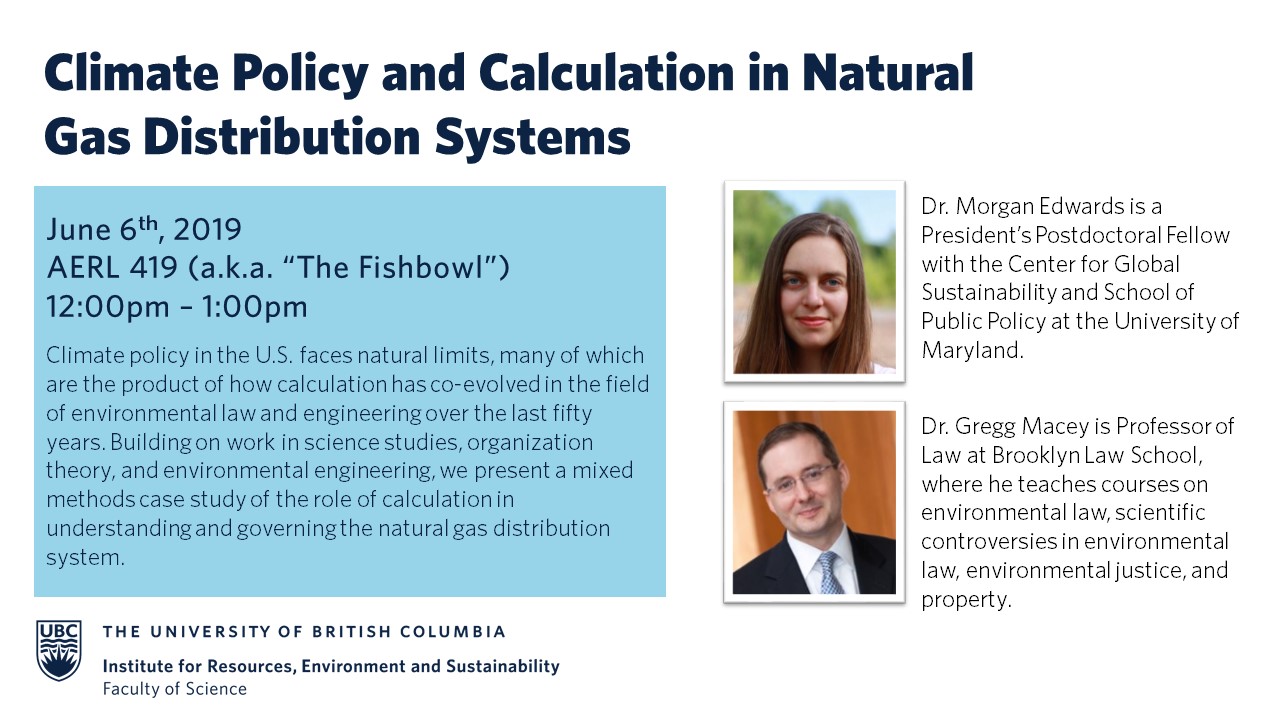
Abstract
Climate policy in the U.S. faces natural limits, many of which are the product of how calculation has co-evolved in the field of environmental law and engineering over the last fifty years. Building on work in science studies, organization theory, and environmental engineering, we present a mixed methods case study of the role of calculation in understanding and governing the natural gas distribution system.
We first examine the work of a coalition of environmentalists, academics, non-profits, and utility companies in Massachusetts known as the “Gas Leaks Allies.” The coalition accomplished much, from agenda-setting to advances in environmental monitoring to legislation. These steps proceeded through distributed calculating agents and threshold levels of calculative power. For purposes of our research, “calculation” is not synonymous with quantitative analysis but involves quantitative methods, qualitative analysis, professional judgment, and adjustments to practice. We recast the Allies’ focus on methane emissions from natural gas infrastructure as an attempt to facilitate combinations of new entities and demarcations and calculative power to enable policy-relevant knowledge creation.
We then turn to the question of repairing leaks in the natural gas distribution system. Using a new spatial dataset of utility-reported leaks and repairs, we find that 13-25% of repairs in Massachusetts over the past several years were unsuccessful. By not including repair failures, assessments overestimate the benefits of a natural gas bridge and underestimate the benefits of an accelerated phaseout. We conclude by discussing how calculative power can inform broader debates in the design and implementation of climate policy.
Bios:
 Dr. Morgan Edwards is a President’s Postdoctoral Fellow with the Center for Global Sustainability and School of Public Policy at the University of Maryland. Her research examines fossil fuel transitions using a mixed methods approach, combining bottom-up datasets, integrated modeling, and qualitative analysis. She is interested in developing new methods to assess impacts with high spatial and temporal heterogeneity, due to variability in technology features, environmental conditions, and energy stakeholders. Current projects include developing spatial analysis tools for leaky natural gas systems, assessing the plant-by-plant implications of accelerated coal retirement, and quantifying near-term emissions reductions from U.S. subnational climate policies. Morgan received her PhD in Engineering Systems and SM in Technology Policy from the Massachusetts Institute of Technology and her BS in Environmental Science from the University of North Carolina at Chapel Hill.
Dr. Morgan Edwards is a President’s Postdoctoral Fellow with the Center for Global Sustainability and School of Public Policy at the University of Maryland. Her research examines fossil fuel transitions using a mixed methods approach, combining bottom-up datasets, integrated modeling, and qualitative analysis. She is interested in developing new methods to assess impacts with high spatial and temporal heterogeneity, due to variability in technology features, environmental conditions, and energy stakeholders. Current projects include developing spatial analysis tools for leaky natural gas systems, assessing the plant-by-plant implications of accelerated coal retirement, and quantifying near-term emissions reductions from U.S. subnational climate policies. Morgan received her PhD in Engineering Systems and SM in Technology Policy from the Massachusetts Institute of Technology and her BS in Environmental Science from the University of North Carolina at Chapel Hill.
 Dr. Gregg Macey is Professor of Law at Brooklyn Law School, where he teaches courses on environmental law, scientific controversies in environmental law, environmental justice, and property. He has taught at the University of Virginia, Fordham Law School, MIT, and (next year) Boston University. His articles appear in Georgetown Law Journal, Environmental Health, Cornell Law Review, Environmental Management, Arizona State Law Journal, and the Journal of Policy Analysis and Management, among others. Professor Macey has published book chapters in Risk Analysis of Natural Hazards (2016) and Legal Pathways to Deep Decarbonization in the United States (2019), as well as a co-edited volume on the Superfund program, Reclaiming the Land (with Jon Cannon). Prior to academia, he was an associate with the law firm Kirkland & Ellis, a senior associate with E2 Inc., an environmental consulting firm, and a senior associate with the Consensus Building Institute (CBI), a mediation firm. Professor Macey holds a Ph.D. in urban planning from MIT and a law degree from the University of Virginia.
Dr. Gregg Macey is Professor of Law at Brooklyn Law School, where he teaches courses on environmental law, scientific controversies in environmental law, environmental justice, and property. He has taught at the University of Virginia, Fordham Law School, MIT, and (next year) Boston University. His articles appear in Georgetown Law Journal, Environmental Health, Cornell Law Review, Environmental Management, Arizona State Law Journal, and the Journal of Policy Analysis and Management, among others. Professor Macey has published book chapters in Risk Analysis of Natural Hazards (2016) and Legal Pathways to Deep Decarbonization in the United States (2019), as well as a co-edited volume on the Superfund program, Reclaiming the Land (with Jon Cannon). Prior to academia, he was an associate with the law firm Kirkland & Ellis, a senior associate with E2 Inc., an environmental consulting firm, and a senior associate with the Consensus Building Institute (CBI), a mediation firm. Professor Macey holds a Ph.D. in urban planning from MIT and a law degree from the University of Virginia.